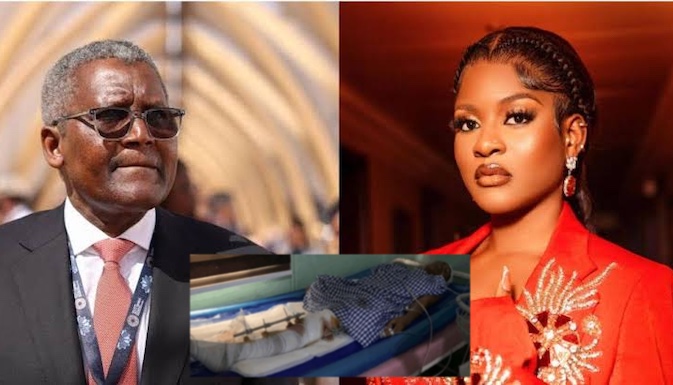
BBNaija Star Phyna Accuses Dangote Group of Cover-Up in Sister’s Tragic Death, Demands Justice

Nigeria woke up to shockwaves on Tuesday morning after Phyna, the fiery winner of Big Brother Naija 2022, went live with explosive accusations against Africa’s richest conglomerate, the Dangote Group.
In a tearful, rage-filled rant that quickly amassed 188,000 views overnight, Phyna alleged that her younger sister, 19-year-old Ruth Otabor, was deliberately injected to death at Lagoon Hospital, Lagos, on the instructions of Dangote Group.
According to Phyna, Ruth was the victim of a ghastly accident on August 13, 2025, when a Dangote Cement truck rammed into her near Auchi Polytechnic in Edo State.
The crash crushed her legs, forcing doctors to amputate one limb. While the family grappled with hope and despair, Ruth’s health deteriorated.
Weeks later, Phyna now claims, her sister was silenced permanently—not by the accident itself but by what she describes as a “fatal injection” to avoid prolonged treatment costs that could run into billions.
Her words, drenched in grief, were unflinching: “My sister was not killed by the truck. She was killed because the Dangote people didn’t want to spend money on her. They ordered Lagoon Hospital to finish her. They injected her and she never came back.”
The allegations, wild as they sound, immediately set social media ablaze. Hashtags like #JusticeForRuth and #PhynaVsDangote began trending within hours, drawing sympathy, outrage, and demands for a full investigation. Nigerians who have long accused truck drivers attached to large companies of reckless road habits found in Phyna’s outburst a painful mirror of their fears—that ordinary citizens often end up victims of corporate power without meaningful accountability.
For Ruth, the tragedy began on a quiet Wednesday. Witnesses say she had just left the campus gates at Auchi Polytechnic when the heavy-duty cement truck, driven by what locals later described as an unlicensed and inexperienced hand, lost control and crushed her.
The impact left her battling for life, her education and dreams torn apart in seconds. After initial treatment in Auchi, Ruth was transferred to Lagoon Hospital in Lagos, where amputation offered a fragile chance at survival.
But Phyna insists her sister’s case became less about medicine and more about money. She claims that after the Dangote Group discovered the long-term costs of prosthetics, rehabilitation, and trauma care could exceed ₦5 billion, executives decided to cut their losses. The family, she said, was instead offered ₦20 million in compensation—an amount she described as an insult and a betrayal.
“They bailed the driver the same week,” Phyna fumed in her viral video. “They told us ₦20 million should be enough. They killed my sister because they didn’t want to pay what her life was worth.”
Dangote Group, in a swift response, denied the accusations, calling them “baseless and malicious.” The company admitted that its truck was involved in the August 13 accident but insisted Ruth’s death was a medical outcome, not a conspiracy. A spokesperson noted that the company has “a tradition of supporting accident victims” and confirmed that compensation was being arranged for the family. The statement further condemned “the spread of unfounded rumors that endanger public trust.”
The hospital at the center of the storm, Lagoon Hospital, has so far maintained silence. But the claim that a young woman was injected to death at the behest of one of Africa’s most powerful corporations has thrown Nigeria into heated debate about road safety, corporate responsibility, and the worth of human lives in a country where justice often seems negotiable.
Public sympathy remains heavily on Phyna’s side. As a celebrity with a history of blunt honesty, her credibility with fans is strong. Her video, raw and unfiltered, painted the picture of a family robbed not just of a daughter but of dignity in the face of wealth and power. Nigerians online quickly drew parallels with other accidents involving Dangote trucks in recent years, where victims’ families accused the conglomerate of dodging responsibility through quick settlements or drawn-out legal battles.
The case has now become more than personal grief—it is a national talking point. Activists are demanding a transparent inquiry into Ruth’s death, while legal experts argue that the family could push for damages in court far exceeding the ₦20 million offered.
Meanwhile, Ruth’s remains have reportedly been evacuated for burial, a development that has further angered campaigners who insist an independent autopsy should be conducted to verify or refute Phyna’s claims of foul play.
In the streets of Auchi, Ruth’s death is not just another statistic but a scar. A teenager who once dreamed of completing her studies is now gone, and in her place remains a family’s sorrow and a nation’s outrage.
At the heart of the storm is a question Nigerians have asked for decades: when the poor collide with the powerful, who truly gets justice?
As the hashtag #JusticeForRuth continues to dominate online spaces, one thing is certain—Phyna’s cries will not fade quietly. Her pain has become a rallying call, her accusations a spotlight on the uneasy marriage between wealth, power, and accountability in Africa’s largest economy.
And for Ruth, whose short life was swallowed in tragedy, her story may yet become the spark that forces Nigeria to confront a truth it has long avoided: the roads are dangerous, but sometimes, the greater danger lies in the silence that follows.
Watch the video below
"Dangote gave us just 20 million after my sister da!d, My mind is telling me that Dangote company told the hospital to inj£ct my sister……" - Phyna says as she returns with fresh allegations against Dangote group 🙆🏼♂️ pic.twitter.com/xwrBYBK2wY
— Oyindamola🙄 (@dammiedammie35) September 30, 2025


